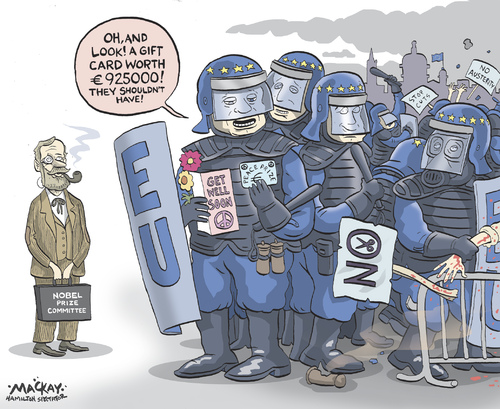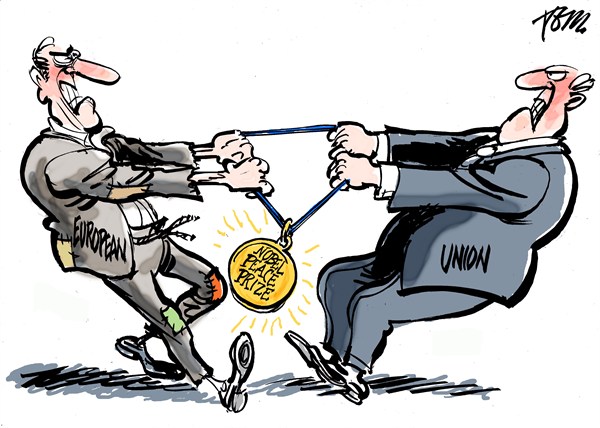“Worst Nobel Prize ever”? Comparing English and Dutch responses to the Nobel Peace Prize for the European Union on Twitter and Google News
Last week’s announcement that the European Union has been awarded this year’s Nobel Peace Prize has spurred a host of comments in both traditional and online media. Many critics decried the timing of the award committee, which they considered inopportune in light of the financial crisis that plagues Europe, or were critical about the apparent overlooking of the wars in the former Yugoslavia or European participation in wars in the Middle East, while others praised the Nobel Peace Prize committee’s as a healthy reminder of the Union’s achievements in a difficult time or a well deserved recognition of the contribution of the European Union and its predecessors to peace.
In this post I will explore the reactions to the news that the EU had been given this award expressed on twitter and in articles indexed by Google News in an effort to chart the differences between what might be called the Twittersphere and the newssphere. Moreover in an effort to find out whether the same role is fulfilled by these two spheres in different national contexts, I have examined Dutch as well as English tweets and articles indexed by three national versions of Google News: those for the U.K., the U.S. and the Netherlands.
My approach takes after earlier attempts at cross-spherical analysis such as the Digital Methods Initiative’s Issue Animal Analysis project and Cacciatore et al.’s (2012) comparison of the coverage of nanotechnology related news on blogs and news articles (as indexed by Google Blog Search and Google News), in that I have allowed digital devices (i.e. Twitter and Google News) to the demarcate the spheres I’m set to examine.
The data on which my analysis is based consists of three sets of 200 tweets from October 12 (the day that the news that the E.U. had won the award was announced) to October 14, and three sets of entries of articles on the award indexed by different national versions of Google News (those for the U.S., U.K., and the Netherlands). The tweets were scraped with the Digital Methods Initiative’s Twitter Scraper, while the Google News results were captured manually with the Firefox add-on Zotero. In an effort to minimize the extent to which my results were influenced by personalization I made use of a research-browser and made sure I was not logged in on a Google account, when I entered my queries into Google News.
My analysis took the form a somewhat superficial form of content analysis, based on the content of the tweets and the titles and short descriptions of the news articles, wherein all tweets and articles where coded either as:
1. positive, if the content (a) was itself positive about the award for the E.U. or (b) referred to a positive reaction
e.g.: (a) “Brilliant, inspired, flabbergasting, enlightened, wonderful, elating and visionary choice: the #EU gets the #Nobel Prize for Peace”
(b) “The Washington Post gives an analysis of why the EU deserves the #Noblepeaceprize http://t.co/RRsSYPry #EU”
2. negative, if the content (a) was itself negative or (b) referred to a negative reaction,
e.g.: (a) “Wow the Nobel Peace Prize club has really gone downhill. Kissinger, Obama now the EU? #fail”
(b) “Greece shocked at EU peace prize amid economic ‘war’ – http://t.co/G2lC65nW”
3. nuanced, if the content (a) mentioned ambivalent feelings about the award or (b) expressed both positive and negative feelings towards the award
e.g.: (a) “#Vandaag een #PRIJS #gewonen, #nobelprijs, alle #europeanen ik heb hier wel een #dubbelgevoel van. Whaa. #Europa #nl #nederland” [dubbelgevoeld translates as mixed feelings, LR]
(b) “67 jaar vrede in Europa: een Nobelprijs waard. Ik weet alleen niet of ze ons exportproduct vrede ook waarderen in Irak en Afghanistan. #eu” [my translation: 67 years of peace in Europe, worthy of a Nobel Prize. But I do not know if they also appreciate our export, peace, in Iraq and Afghanistan]
4. indicative of controversy, if the content made mention of controversy or multiple contrary opinions about the award
e.g.: “European Union’s Nobel peace prize win treated with joy and derision”
5. neutral, if the content only made mention of the news that the European Union had been awarded the Nobel Peace Prize
e.g.: “EU awarded Nobel Peace Prize”
6. not relevant/spam, if the tweet or article in question did not touch upon the subject of the Nobel Peace Prize for the European Union
e.g.: “In 1901, he won the Nobel Peace Prize.”
7. other, if none of the categories listed above applied
The results of this little exercise can be seen in the table below:
| Google News articles and Tweets on the Nobel Peace Prize for the EU | Positive | Negative | Nuanced | Controversy | News | Not relevant | Other | Total |
| “Nobel Prize” (Twitter Scraper not set to specific language) Oct. 12 | 7 | 61 | 0 | 3 | 10 | 24 | 95 | 200 |
| “Nobel Peace Prize” (Twitter Scraper set to English) Oct. 14 | 14 | 66 | 0 | 0 | 7 | 58 | 55 | 200 |
| “Nobelprijs Europa” (Twitter Scraper set to Dutch) Oct. 14 | 29 | 67 | 6 | 1 | 4 | 15 | 78 | 200 |
| “Nobelprijs Europa” (Google News – version for NL) Oct. 14 | 4 | 7 | 0 | 5 | 4 | 0 | 6 | 26 |
| “Nobel Prize European Union” (Google News – version for UK) Oct. 14 | 3 | 11 | 1 | 4 | 8 | 0 | 3 | 30 |
| “Nobel Prize European Union” (Google News – version for US) Oct. 14 | 5 | 5 | 0 | 2 | 8 | 0 | 6 | 26 |
As is illustrated by the graph included below, most of the outspoken tweets (i.e. the tweets that were either positive or negative) were critical. In the two English query the negative tweets made up 90% and 83% of the tweets that expressed an opinion on the giving of the award to the Union respectively. In spite of some negative tweets from diverse corners of the political spectrum – from the right-wing party leader Wilders as well as from former Green Party leader and figurehead Femke Halsema – that received attention in the Dutch traditional media, the Dutch tweets were noticeably more positive with ‘only’ 70% percent of the outspoken tweets outspokenly negative. The Dutch twitter users made up for this lack in negativity in part with their criticism of those who were negative about the award: 26 of the 200 tweets in the Dutch sample contained complains about the incessant criticism of Europe and the award. One often much retweeted tweet, for example, reads: “@WimvandeCamp: @dicknieuwenhuis Zeker. Ik ben hartstikke trots op die Nobelprijs. Maar dat gezeik in NL van de Europa sceptici, ik word er moedeloos van” [Sure, I’m very proud of the Nobel Prize. But the incessant abuse from Euro-skeptics tires me]. Similar tweets also appear in the English samples (e.g.: RT @DavidAllenGreen: Norway not member of EU. RT @wikileaks: The Nobel Peace Prize is awarded by Norway-a NATO and EU member. It is [blah blah conspiracy…]), but far less often (3 times in 400 tweets vs. 26 times in 200 tweets). Among the Dutch tweets also were a handful (six, to be precise) of nuanced messages, which were lacking entirely in the English samples. Among the Dutch tweets also were a handful (six, to be precise) of nuanced messages, which were lacking entirely in the English samples. The articles brought forth by Google News were a little more ‘balanced’ than the Twitter comments: of the opinioned articles supplied by the U.S. version provided an exact 50/50 split, for the U.K. version 21% was positive (and 79% negative), and of the Dutch entries 36% was positive.
Now let us briefly turn towards the grand total of 228 out of 600 (i.e. 38% of the Tweets in the three samples) that ended up in the “other” category. Most of these Tweets were jokes, either about the fact that Europe can make good use of the money attached to the Nobel Prize (in light of the economic crisis), the fact that this money adds up to little if divided among all the citizens, the fact that all citizens had won a Nobel Prize and could add it to their CV, and the ‘news’ report that there exists a strong correlation between the amount of chocolate eaten in a country and the number of Nobel Prize laureates it has brought forth. Another genre of tweets consisted of suggestions either for candidates for the peace prize (with Malala Yousufzai the most popular among the suggestions) or for worthy recipients of the award (with children from all member states and Helmut Kohl among the more popular suggestions).
Considering the small size of the samples, and the fact that the statistical differences discussed above often were rather minor, it would not be wise to reach far-reaching conclusions on the basis of the research presented here. After looking at the tweets here and a number of political cartoons on the subject (see below), it is tempting to conclude that Twitter responses to the news are fairly similar to the responses of cartoonists, as both are characterized by a prevalence of criticism and humor, and because many of the same jokes are made by twitter users and cartoonists.
Compare, for example, these tweets:
- RT @politicalmath: Maybe the EU got the Nobel Peace Prize because the judges figured they could use the extra cash.
- RT @BCAppelbaum: At least the EU didn’t win the Nobel Prize for economics.
- RT @Edourdoo: LOL RT @PaulHamilos: Â If the EU really has won the Nobel prize, will Germany collect the prize, then refuse to share it with the Greeks
- nu moet Europa nog ruziemaken wie de Nobelprijs voor de vrede mag ophalen #PenW [now Europe should be about to fight about who gets to pick up the Nobel Peace Prize, my translation, Lucas Reehorst]
- RT @SyedKamall: I wonder if the EU was awarded the Nobel Peace Prize for the harmony the euro has created on the streets of Athens and Madrid.
With the following cartoons:
Fig. 4 – Chappatte – ‘We Would Rather Have Received the Nobel for Economy’ © Chappatte in “Le Temps” (Geneva)
References
Cacciatore, Michael A., Ashley A. Anderson, Doo-Hun Choi, Dominique Brossard, Dietram A. Scheufele, Xuan Liang, Peter J. Ladwig and Michael Xenos. Coverage of emerging technologies. A comparison between print and online media. New Media & Society. 14.6: 1039-1059.
Digital Methods Initiative. ‘Issue Animals Research.’ Digital Methods Initiative wiki. Accessed online on 10-16-2012 https://wiki.digitalmethods.net/Dmi/IssueImageAnalysis


